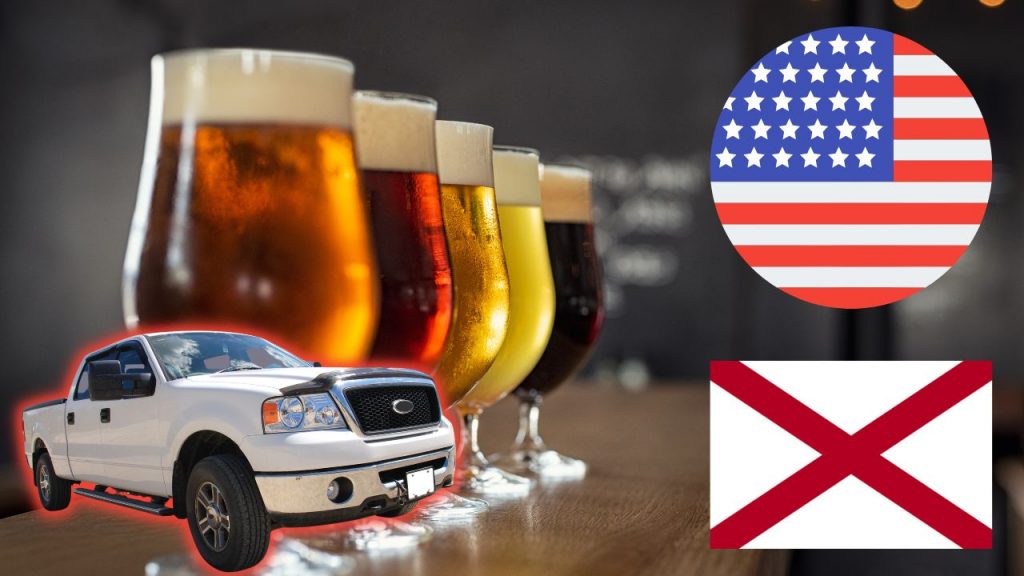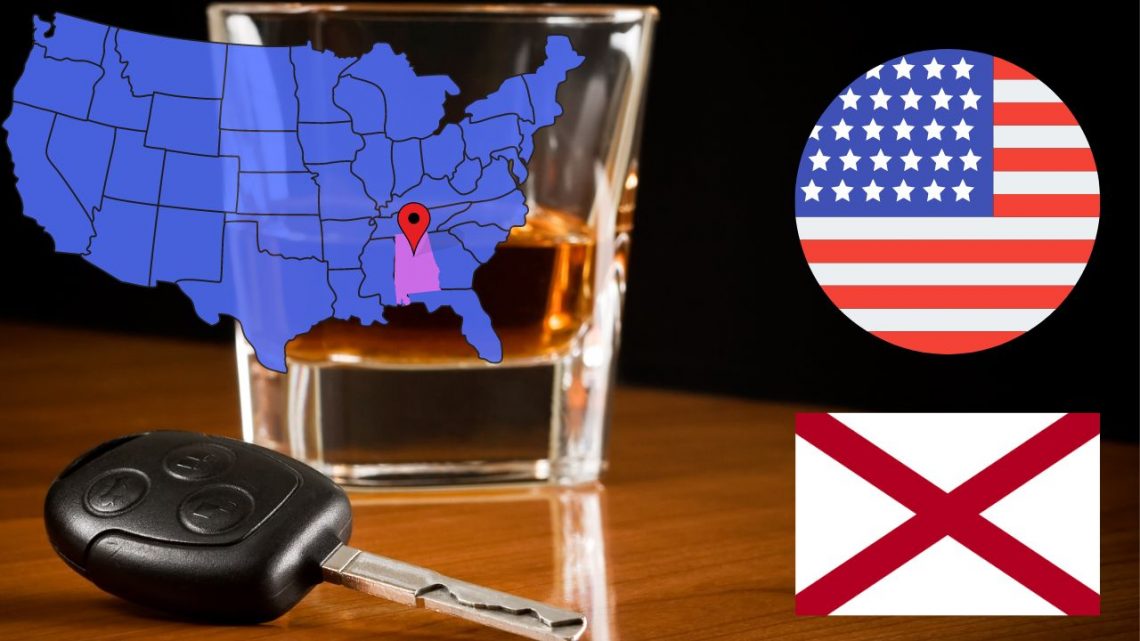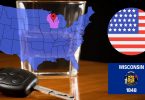In Alabama, the maximum permissible blood alcohol content (BAC) level is set at 0.08%, equivalent to 80 milligrams of alcohol per 100 milliliters of blood.
Before getting into the specifics of impaired driving in Alabama, remember that the purpose of this article is strictly informational. This post should not be construed as an endorsement of drinking and driving in any state or region.
What is the Legal Alcohol Limit for Driving in Alabama?
In Alabama, the legal alcohol limits for driving vary depending on the driver’s category. These limits are strictly enforced to enhance road safety and reduce alcohol-related incidents. Here is a breakdown of the legal blood alcohol content (BAC) limits for each driver category:
- Regular Drivers: The legal BAC limit is 0.08%. This applies to the majority of private vehicle drivers.
- Commercial License Holders: For those holding a commercial driver’s license, the legal BAC limit is reduced to 0.04%, reflecting the higher responsibility associated with operating commercial vehicles.
- Drivers Under 21: Alabama has a zero-tolerance policy for underage drinking and driving. Therefore, any driver under the age of 21 is prohibited from driving or being in actual physical control of a vehicle if their BAC is 0.02% or higher.
These limits are designed to keep roads safe and drivers accountable for their actions while behind the wheel.
Drink and Drive Penalties and Punishments in Alabama
In Alabama, the penalties and punishments for driving under the influence (DUI) are severe and structured to deter such behavior. It is essential for drivers to understand these consequences and to regularly check the official state website for any updates or changes to the law. Below is an outline of the penalties as they stand:
- First Conviction:
- Imprisonment: Up to 1 year in county or municipal jail.
- Fine: Between $600 and $2,100.
- License Suspension: 90 days by the Director of Public Safety.
- Additional Penalties: Mandatory ignition interlock device installation for 2 years if refusing a BAC test, a child under 14 is in the vehicle, or if another person is injured.
- Second Conviction (within 5 years):
- Fine: Between $1,100 and $5,100.
- Imprisonment: Up to 1 year, with a mandatory sentence of at least 5 days or 30 days of community service.
- License Revocation: 1 year.
- Additional Penalties: Mandatory ignition interlock device installation for 2 years.
- Third Conviction:
- Fine: Between $2,100 and $10,100.
- Imprisonment: 60 days to 1 year, with a minimum of 60 days non-probational.
- License Revocation: 3 years.
- Additional Penalties: Mandatory ignition interlock device installation for 3 years.
- Fourth or Subsequent Conviction:
- Classification: Class C felony.
- Fine: Between $4,100 and $10,100.
- Imprisonment: 1 year and 1 day to 10 years.
- License Revocation: 5 years.
- Additional Penalties: Mandatory ignition interlock device for 5 years.
- Special Circumstances:
- BAC of 0.15% or More: Double the minimum punishment.
- Presence of a Child Under 14: Double the minimum punishment.
It’s important to remember that these laws are subject to change and that Alabama’s habitual felony offender law does not apply to these convictions. Always consult the official state website or legal counsel for the most current information.
How to Determine if Your Blood Alcohol Content is Legal in Alabama
In Alabama, like in many states, the police use specific methods to determine if a driver’s blood alcohol content (BAC) is above the legal limit. Understanding these methods can help you stay informed and make responsible decisions.
Police Methods in Alabama:
- Field Sobriety Tests: These are preliminary tests conducted by police officers on the roadside to assess a driver’s sobriety.
- Breathalyzer Test: This is a commonly used tool that measures the alcohol level in a person’s breath. It’s a quick and effective method for police to assess if a driver is over the legal BAC limit of 0.08%.
As an experienced phlebotomist, I recommend two ways for you to check your BAC level:
Use a High-Quality Alcohol Breathalyzer:
I specifically recommend the BACtrack S80. This device offers professional-grade accuracy and is DOT & NHTSA approved as well as FDA 510(k) cleared. It’s a reliable tool and I advise keeping one in your car. Remember, people in Alabama sometimes underestimate their BAC level, leading to impaired driving. The BACtrack S80 can provide a helpful and quick assessment.
Utilize My BAC Calculator:
I’ve collaborated with fellow phlebotomists and web developers to create an online BAC calculator. This tool can help you estimate your BAC level based on various factors like your weight, the number of drinks consumed, and the time period over which you’ve been drinking.
Important Consideration:
While both the BACtrack S80 and the online BAC calculator are useful tools, it’s crucial to remember that they may not provide 100% accurate results. However, they can offer a good indication of your BAC level and potentially prevent you from driving when you are over the 0.08% limit.
Remember, these tools are meant to assist in decision-making, not to enable drinking and driving. The safest option is always to not drive if you’ve been drinking.
Ways to Avoid Driving with a High BAC in Alabama

Driving with a high blood alcohol content (BAC) not only poses serious risks to your safety and the safety of others but also has legal consequences in Alabama. It’s essential to plan ahead to ensure you don’t end up behind the wheel if you’ve been drinking. Here are some practical tips:
- Utilize Rideshare Apps or Local Taxi Services:
- In today’s digital age, using a rideshare app like Uber or Lyft is one of the easiest and most convenient ways to avoid driving under the influence. These apps are user-friendly and provide a safe way to get home.
- Alternatively, you can rely on local taxi companies. For instance, if you’re in Huntsville, consider using DYME TYME, or if you’re in Birmingham, Airport Taxi Birmingham Metro Cab is a reliable choice. These local services offer a safe and responsible way to travel after drinking.
- Opt for Designated Driver Services:
- If you’ve driven to a location and find yourself unable to drive back safely, consider using a designated driver service. This is a great option if you want to avoid leaving your car behind.
- In Huntsville, a service like Classy Limo Service can be a sophisticated choice, while in Birmingham, Omni Transport Luxury Chauffeured Services LLC offers a high-end experience. To find similar services in other cities, simply search for “designated driver service” online, followed by your city’s name.
By opting for these alternatives, you not only ensure your safety and adhere to the law but also contribute to a safer community by preventing potential accidents due to impaired driving. Always remember, no matter the circumstance, it’s never worth taking the risk of driving after drinking.
Sticking to Impaired Driving Laws in Alabama: Sad Statistics
In Alabama, driving under the influence is legally defined as operating a vehicle while too impaired to do so safely. Despite the state’s stringent impaired driving laws, there were 277 alcohol-related fatalities in 2019, underscoring the ongoing risks. To stay informed about the latest driving regulations, regularly visiting Alabama’s official state website is recommended.
It’s important to remember that safe driving is crucial for the well-being of all road users. If you’re intoxicated, consider alternative transportation options like hailing a cab, using Uber, or asking a friend for a ride. If driving is unavoidable, ensure your BAC level is below the legal limit and that you’re fully capable of driving safely. However, the best and safest course of action after drinking is to avoid driving altogether. Personal judgment of BAC levels can be misleading, as reactions to alcohol vary greatly among individuals. For your safety and others’, it’s best to stay informed about impaired driving rules and make responsible choices.







